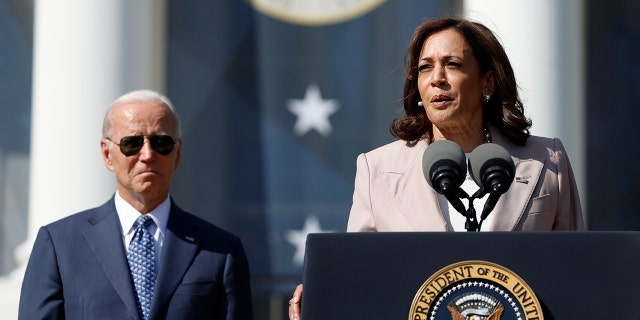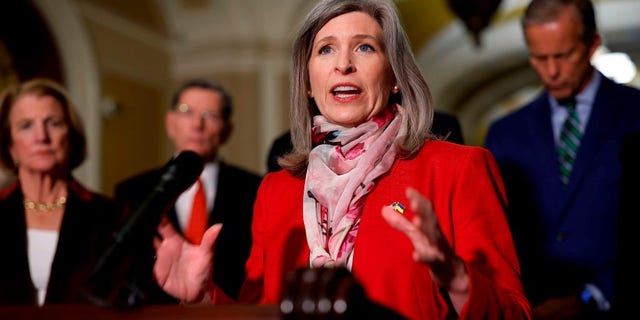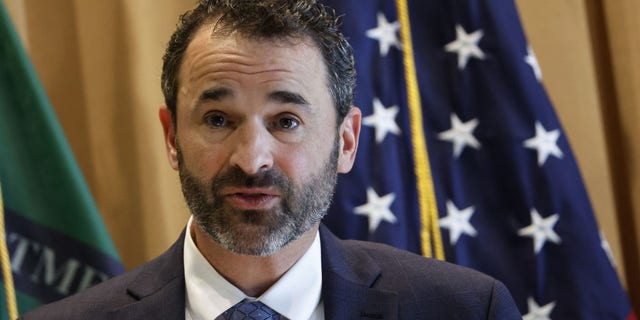IRS touts Biden's legislation for 'Small Business Week' despite concerns law will hurt small businesses
Experts, lawmakers warn Inflation Reduction Act could hurt small businesses more than anyone
The IRS used National Small Business Week to tout President Biden's Inflation Reduction Act, which critics argue will allow the IRS to target small businesses for more tax money.
National Small Business Week runs from April 30 through May 6. To mark the occasion, the IRS sent out a news release giving "advice" on how small business taxpayers can take advantage of new and existing tax benefits.
"The IRS is joining the Small Business Administration and others in both the public and private sector to celebrate the hard work, ingenuity and dedication of America's small businesses and their contributions to the economy," the release said. "With next year’s filing deadline nearly a year away, entrepreneurs still have time to identify possible tax benefits, take action to qualify for them and then claim them when they file in 2024. They also have time to plan for reporting changes and even claim overlooked tax benefits from the recent past."
 The IRS noted potential benefits for businesses that continued paying their employees during the COVID pandemic and that help pay their employees' student loan obligations, among others. However, the first benefits listed were ways for small businesses to "cut energy costs" and "expand clean energy credits" due to the Inflation Reduction Act, a massive, Democrat-backed spending package that Biden signed into law last year.
The IRS noted potential benefits for businesses that continued paying their employees during the COVID pandemic and that help pay their employees' student loan obligations, among others. However, the first benefits listed were ways for small businesses to "cut energy costs" and "expand clean energy credits" due to the Inflation Reduction Act, a massive, Democrat-backed spending package that Biden signed into law last year.
Vice President Kamala Harris gives remarks alongside President Biden at an event celebrating the passage of the Inflation Reduction Act on the South Lawn of the White House Sept. 13, 2022, in Washington, D.C. (Anna Moneymaker/Getty Images)
IRS UNVEILS SPENDING PLAN FOR $80B FUNDING BOOST
"The Inflation Reduction Act (IRA), enacted last summer, includes provisions that can save small business owners money on energy costs," the release said. "Small businesses can receive a tax credit covering 30% of the cost of switching over to low-cost solar power, lowering operating costs and protecting against volatile energy prices.
"Small business building owners can receive a tax credit up to $5 per square foot to support energy efficiency improvements that deliver lower utility bills. Through the Clean Commercial Vehicle Credit, small businesses that use vehicles such as trucks and vans can benefit from tax credits up to 30% of purchase costs for clean commercial vehicles, like electric and fuel cell models that meet applicable requirements.
"There is no limit on the number of Clean Commercial Vehicle credits a business can claim. These credits are nonrefundable, so businesses can't get back more on the credit than they owe in taxes."
The news release came two weeks after Sen. Joni Ernst, R-Iowa, wrote a letter to IRS Commissioner Daniel Werfel accusing his agency of launching a "witch hunt" against small businesses over its plan outlining how it will spend money from Biden's Inflation Reduction Act.
"Now is simply not the time to place unnecessary burdens on our small businesses as they continue to grapple with recent economic challenges," Ernst wrote. "Instead of commencing on a witch hunt on small businesses by enhancing audit rates without justification, we should focus on tax solutions that promote small business growth and economic competitiveness."
 The Inflation Reduction Act granted $80 billion to the IRS to hire thousands of new employees over the next decade. The IRS wrote in its recently published "strategic operating plan" that it will use the funds in part to "increase enforcement activities in other key areas where audit coverage has declined while complying with Treasury's directive not to increase audit rates relative to historical levels for small businesses and households earning $400,000 per year or less."
The Inflation Reduction Act granted $80 billion to the IRS to hire thousands of new employees over the next decade. The IRS wrote in its recently published "strategic operating plan" that it will use the funds in part to "increase enforcement activities in other key areas where audit coverage has declined while complying with Treasury's directive not to increase audit rates relative to historical levels for small businesses and households earning $400,000 per year or less."Ernst specifically cited that provision, which suggests businesses making more than $400,000 per year could be subject to the IRS's increased "enforcement activities," arguing such a threshold is lower than any other industry standard for a "large business."

Sen. Joni Ernst, R-Iowa, talks to reporters following the weekly Senate Republican policy luncheon in the U.S. Capitol Feb. 14, 2023. (Chip Somodevilla/Getty Images)
ERNST ACCUSES IRS OF 'WITCH HUNT' AGAINST SMALL BUSINESSES WITH AUDIT PROPOSAL
The senator demanded that Werfel provide more clarity on how the IRS proposal would be implemented, such as whether the $400,000 figure references net income or the business’s revenue.
"It is not clear by which precedent the IRS determined that a large business is any entity earning more than $400,000 in revenues. Under this approach, enhanced tax enforcement efforts would sweepingly apply to small businesses across the country," Ernst wrote. "It is abundantly clear that small businesses will bear the brunt of these enforcement efforts; not solely large corporations and the wealthiest taxpayers."
The senator noted that a small business with about five employees would bring in more than $424,000 on average, citing data from the U.S. Census Bureau.
Both Werfel and Treasury Secretary Janet Yellen have repeatedly vowed that funding from the Inflation Reduction Act will not go toward increased audits for middle- and low-income Americans or anyone making less than $400,000 per year.
 When reached for comment for this story, the IRS directed Fox News Digital to comments made by Werfel in testimony before the House Ways and Means Committee last week.
When reached for comment for this story, the IRS directed Fox News Digital to comments made by Werfel in testimony before the House Ways and Means Committee last week."[Inflation Reduction Act] funding also gives us an important opportunity to improve enforcement efforts to promote fairness while respecting taxpayers' rights," said Werfel. "The agency will follow Secretary Yellen's directive not to raise audit rates above historic levels for small businesses and households making less than $400,000.
"I want to be crystal clear: We are not increasing audit rates for hardworking taxpayers making under $400,000. That is my pledge. There is no new surge of audits coming for workers, retirees and others."

Danny Werfel, commissioner of the IRS, speaks after being ceremonially sworn in at the IRS headquarters in Washington, D.C., April 4, 2023. (Ting Shen/Bloomberg via Getty Images)
IRS ISSUES 12 MILLION TAX REFUNDS AFTER CORRECTING FOR 2020 UNEMPLOYMENT BENEFIT BREAK
A Government Accountability Office report from last year found that the majority of IRS audits historically are conducted on individuals and businesses below the $400,000 threshold.
Werfel later added that the IRS' "plan is to focus our enforcement efforts on complex returns of high-wealth filers."
Despite the IRS chief's comments, however, Yellen didn't deny in congressional testimony in March that potentially 90% of new IRS audits using Inflation Reduction Act resources would come from lower- and middle-income individuals making less than $400,000 annually.
 Indeed, Yellen was asked by Rep. Adrian Smith, R-Neb., to clarify whether her directive meant the total number of audits annually of families earning less than $400,000 wouldn't increase or if she meant the proportion of new audits targeting those families wouldn't exceed historical rates.
Indeed, Yellen was asked by Rep. Adrian Smith, R-Neb., to clarify whether her directive meant the total number of audits annually of families earning less than $400,000 wouldn't increase or if she meant the proportion of new audits targeting those families wouldn't exceed historical rates."I'm talking about the proportion of those small businesses and families," Yellen responded.
"OK, so the proportion. I mean, just for the record, the proportion is 90%," said Smith, referencing the GAO report. "So, 90% of the new audits will be, you know, according to the data, that we can expect up to 90% of new audits to be on those making less than $400,000."

Secretary of the Treasury Janet Yellen Feb. 27, 2023 (Genya Savilov/AFP via Getty Images)
YELLEN DOESN'T DENY THAT 90% OF NEW IRS AUDITS WOULD AFFECT THOSE MAKING UNDER $400K
Yellen didn't reject Smith's conclusion but reiterated that the purpose is to increase the audit rates on high-income earners. However, Smith pointed to data that suggests it will be "broader than that."
Both the GAO and Syracuse University's Transactional Records Access Clearinghouse have found in repeated analyses that low-income taxpayers are audited at a much higher rate than high-income earners.
Experts say it's difficult to calculate an average cost of an IRS audit for the ordinary American, since each audit is unique to a particular circumstance. Some organizations put the average at thousands for a mail audit and tens of thousands for a more intrusive IRS field audit. That doesn't include additional penalties or potentially thousands of dollars needed to pay for lawyers or accountants to help with the auditing process, which can be complex and require going through confusing paperwork.
Another issue that taxpayers can face when confronted with audits is the legal process should they challenge the IRS. Unlike normal courtrooms, where defendants are presumed innocent until proven guilty, in tax court the burden of proof is on the taxpayer to prove the IRS wrong.
No comments: